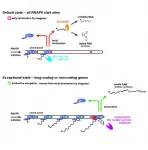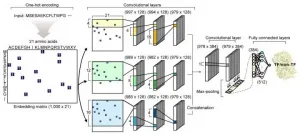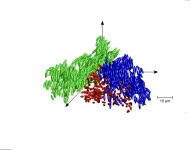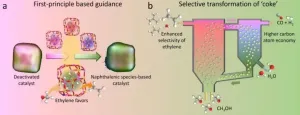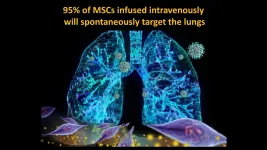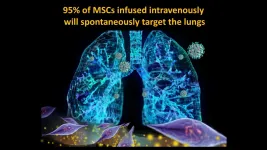Dental experts discover biological imbalance is the link between gum and kidney disease
Research on link between gum and kidney disease
2021-01-05
(Press-News.org) An imbalance of the body's oxygen producing free radicals and its antioxidant cells could be the reason why gum disease and chronic kidney disease affect each other, a new study led by the University of Birmingham has found.
Periodontitis - or gum disease - is a common, inflammatory disease which causes bleeding gums, wobbly or drifting teeth and can eventually result in tooth loss.
Previous studies have shown a link between the severe oral inflammation caused by gum disease and chronic kidney disease (CKD) which demonstrated that those with worse inflammation of the gums have worse kidney function.
Previous research also showed that patients with CKD and periodontitis experience a drop in survival rates, similar in magnitude to if they had diabetes instead of gum inflammation, suggesting that gum inflammation may casually affect kidney function.
In this latest study, led by researchers at the University of Birmingham, over 700 patients with chronic kidney disease were examined using detailed oral and full-body examinations including blood samples. The aim was to test the hypothesis that periodontal inflammation and kidney function affect each other and to establish the underlying mechanism that may facilitate this.
Results showed that just a 10% increase in gum inflammation reduces kidney function by 3%. In this group of patients, a 3% worsening in kidney function would translate to an increase in the risk of kidney failure over a 5 year period from 32%-34%. Results also showed that a 10% reduction in kidney function increases periodontal inflammation by 25%.
In contrast to current beliefs that inflammation is the link between periodontitis and other systemic diseases, researchers found for the first time, that in this group of patients, the effect was caused by a biological process called 'oxidative stress' - or, an imbalance between reactive oxygen species and the body's antioxidant capacity which damages tissues on a cellular level.
Lead author Dr Praveen Sharma, from the Periodontal Research Group at the University of Birmingham's School of Dentistry, said: "This is the first paper to quantify the casual effect of periodontitis on kidney function and vice-versa as well as the first to elucidate the pathways involved.
"It showed that even a modest reduction in gum inflammation can benefit renal function. Given the relative ease of achieving a 10% reduction in gum inflammation, through simple measures like correct brushing techniques and cleaning between the teeth, these results are very interesting.
"We hope that this research paves the way for further studies to see if improvements in kidney function, following periodontal care, translate to longer, healthier life for patients with chronic kidney disease. We would also hope that the hypothesis we have identified could be tested in other groups."
INFORMATION:
The paper, 'Oxidative stress links periodontal inflammation and renal function', was published in the Journal of Clinical Periodontology.
For more information, please contact Emma McKinney, Communications Manager, University of Birmingham, on +44 7815607157. Alternatively, contact the Press Office out of hours on +44 (0)7789 921165.
Note to editors:
The University of Birmingham is ranked amongst the world's top 100 institutions, and its work brings people from across the world to Birmingham, including researchers and teachers and more than 6,500 international students from nearly 150 countries.
Sharma et al (2019). 'Oxidative stress links periodontal inflammation and renal function'. Link to paper: https://pubmed.ncbi.nlm.nih.gov/33368493/ DOI: 10.1111/jcpe.13414
The research was led by the Periodontal Research Group, at the University of Birmingham's School of Dentistry, in collaboration with University Hospital Birmingham, Aston University, Boston University and Swansea University.
Funding from the Oral and Dental Research Trust and Kidney Research UK supported this study.
[Attachments] See images for this press release:

ELSE PRESS RELEASES FROM THIS DATE:
2021-01-05
Practicing gratitude and looking to the future will help safeguard our mental wellbeing during Covid-19 lockdowns, a new study in the Journal of Positive Psychology reports.
In the first study of its kind, researchers from the University of Surrey investigated the effectiveness of three psychological interventions -- nostalgia, a sentimentality for the past; gratitude, recognising the good things currently in our life; and best possible self, thinking about positive elements of the future -- and how they each affect wellbeing during lockdowns.
Personal characteristics such as emotion regulation (the ability to respond ...
2021-01-05
In a joint collaboration, Danish and German researchers have characterized a cellular activity that protects our cells from potentially toxic by-products of gene expression. This activity is central for the ability of multicellular organisms to uphold a robust evolutionary 'reservoir' of gene products.
Manufacturing processes need quality control systems in order to ensure proper assembly of functional products. Moreover, space-consuming, and perhaps even toxic, by-products of such processes need to be properly discarded or recycled by efficient waste handling systems.
By analogy, transcription of our genome is an imperfect process that produces large quantities of non-functional and potentially harmful transcripts both from within and ...
2021-01-05
Researchers at the Francis Crick Institute and the University of Western Australia have developed a new imaging method to see where antibiotics have reached bacteria within tissues. The method could be used to help develop more effective antibiotic treatments, reducing the risk of antibiotic resistance.
During bacterial infections like tuberculosis, bacteria enter human cells, which poses a challenge for treatment, as antibiotics must reach and enter all infected cells in order to be effective. If researchers could select for or develop more effective antibiotics based on where they reach, this may reduce the length of treatment ...
2021-01-05
A joint research team from KAIST and UCSD has developed a deep neural network named DeepTFactor that predicts transcription factors from protein sequences. DeepTFactor will serve as a useful tool for understanding the regulatory systems of organisms, accelerating the use of deep learning for solving biological problems.
A transcription factor is a protein that specifically binds to DNA sequences to control the transcription initiation. Analyzing transcriptional regulation enables the understanding of how organisms control gene expression in response to genetic or environmental changes. In this regard, finding the transcription factor of an organism is the first step in the analysis ...
2021-01-05
While glass is a truly ubiquitous material that we use on a daily basis, it also represents a major scientific conundrum. Contrary to what one might expect, the true nature of glass remains something of a mystery, with scientific inquiry into its chemical and physical properties still underway. In chemistry and physics, the term glass itself is a mutable concept: It includes the substance we know as window glass, but it may also refer to a range of other materials with properties that can be explained by reference to glass-like behaviour, including, for instance, ...
2021-01-05
Sunlight offers a potential solution in the search for an energy source that does not harm the planet, but this depends on finding a way to efficiently turn electromagnetic energy into electricity. Researchers from KAUST have shown how a known herbicide can improve this conversion in organic devices.
While solar cells have traditionally been made from inorganic materials such as silicon, organic materials are starting to break through as an alternative because they are light, flexible and relatively inexpensive to make, even offering the possibility for ...
2021-01-05
MTO process, which was first commercialized in 2010, is a catalytic process converting methanol, which is typically made from coal, natural gas, biomass, and CO2, over SAPO-34 zeolite catalyst. It's becoming one of the main streams for producing light olefins, including ethylene and propylene, from non-oil resources.
One of the major challenges in MTO is the rapid deactivation of zeolite catalyst due to the coke deposition.
In industrial practices, a fluidized bed reactor-regenerator configuration is normally used in order to maintain the continuous operation, in ...
2021-01-05
Dr. Camilo Ricordi, director of the Diabetes Research Institute (DRI) and Cell Transplant Center at the University of Miami Miller School of Medicine, and his team of international collaborators are reporting the results of a groundbreaking randomized controlled trial showing umbilical cord-derived mesenchymal stem cell (UC-MSC) infusions safely reduce risk of death and quicken time to recovery for the most severe COVID-19 patients. Dr. Ricordi's peer-reviewed paper has just been published in STEM CELLS Translational Medicine (SCTM) January 2021.
The clinical trial, authorized by the FDA last ...
2021-01-05
Dr. Camilo Ricordi, director of the Diabetes Research Institute (DRI) and Cell Transplant Center at the University of Miami Miller School of Medicine, and his team of international collaborators are reporting the results of a groundbreaking randomized controlled trial showing umbilical cord-derived mesenchymal stem cell (UC-MSC) infusions safely reduce risk of death and quicken time to recovery for the most severe COVID-19 patients. Dr. Ricordi's peer-reviewed paper has just been published in STEM CELLS Translational Medicine (SCTM) January 2021.
The clinical trial, authorized by the FDA last April, was initiated by The Cure Alliance, a 501(c)(3) non-profit organization of research scientists founded ten years ago by Dr. Ricordi for scientists ...
2021-01-05
Like any other plant, Arabidopsis thaliana or mouse-ear cress, needs nitrogen to survive and thrive. But, like maize, beans and sugar beet, it prefers nitrogen in the form of nitrate, growing better on nitrate rich soil. Whereas, pine and rice for example preferentially grow on ammonium nutrition, another form of the key macronutrient nitrogen. If the concentration or the availability of the different forms of nitrogen fluctuate, plants have to adapt quickly. "One of the most important questions is, what is the role of plant hormones in adaptation to the nitrogen availability? How do the machineries within a plant cope with their changing environment?" asks Eva Benková, developmental biologist and Professor at the Institute of Science and Technology (IST) Austria.
Finding the balance
In ...
LAST 30 PRESS RELEASES:
[Press-News.org] Dental experts discover biological imbalance is the link between gum and kidney disease
Research on link between gum and kidney disease

